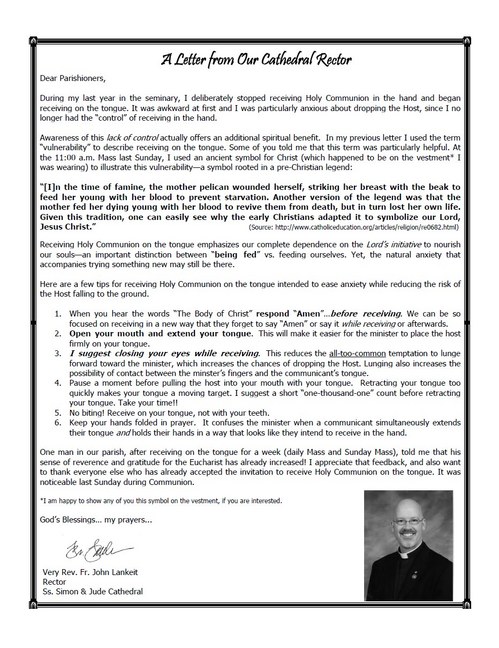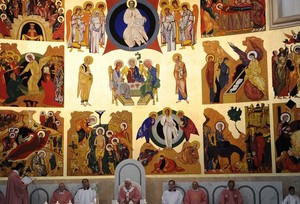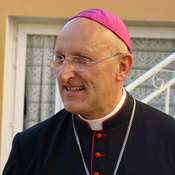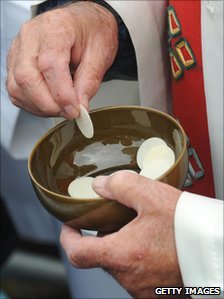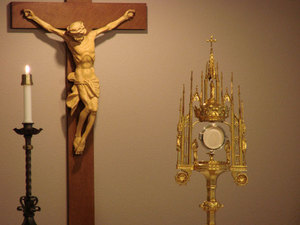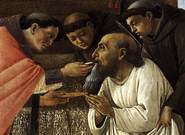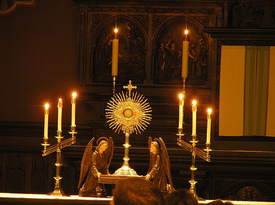In the opening collect for today’s Mass, the priest asked God the Father: “Increase Your Spirit within us and bring us to our promised inheritance.” Here the promised inheritance is none other than communion with the Trinity. It is heaven! Our promised inheritance is the pledge of future glory: Christ received in the Bread of Life. Taste and see the goodness of the Lord!

How much time in the past year have you given thought about your “promised inheritance”? When was the last time you considered your own worthiness to receive the divine gift of the promised inheritance? What criteria exists for someone to receive such a gift? With sin in the world and in our own lives, experience tells me that we want the gift but we don’t really know what it is, why we are receiving a promised inheritance from God and too often we don’t see how sin would prevent us from heaven. BUT do we have sin on our souls? If we didn’t we’d be dead or merely presumptuous.
At last I knew, my conscience, my self-awareness, my religious sense, my own experience of who I am as a person says, I am a sinner. Sin is the falling away from God; it is a radical break in my relationship with God. More precisely, “Sin is an offense against reason, truth, and right conscience; it is failure in genuine love for God and neighbor caused by a perverse attachment to certain goods. It wounds the nature of man and injures human solidarity. it has been defined as ‘an utterance, a deed, or a desire contrary to the eternal law'” (CCC 1849). I fall from grace by word and action, by thought and disordered affections. Don’t you? The psalmist says that man and woman speak with a divided heart, a forked-tongue. Do you confess the truth of Jesus Christ all the time?
Does a divided heart make me a hypocrite? By definition, NO. But it doesn’t if I don’t pretend –at least I don’t think I do– to be anything more than what I am: a loved sinner. A man who sins, falls away from God and yet is loved unconditionally by God, redeemed by Christ. It is Christ’s sacrifice on the Cross and his promise of salvation through Him as the Bread of Life that I am able to be justified. In a word, awareness of one’s sin indicates that you can’t fall off the floor. Were this the awareness of all Catholics who make the claim to know Jesus and receive Him in the Eucharist today!
So, why talk about sin on a Sunday in which we pray that God would bring us to our promised inheritance? For starters in our to accept this wonderful promise we have to be worthy of the gift. Stepping into heaven, being a part of God’s inner, transcendent life we have to be as pure, as holy as we can possibly be give our freedom to say “yes” to God and to cooperate with grace. Accepting the promised gift means that we have to deal truthfully with reality as it is presented to us. And we know from experience, reality has never failed us but we may have failed reality. The Bread of Life offered by Jesus in today’s gospel is not make believe, it is not what we want it to be, it is Himself: body and blood, soul and divinity. The Bread of Life is His real, authentic self. In order to have Christ present in our life and for our prayer to be as effective as possible, we have to consider the frequent prayer, may Your name be held holy.
Saint Cyprian of Carthage says so clearly:
We pray, ‘Hallowed be Thy name,’ not that we wish that
God may be made holy by our prayers but that His name may be hallowed in us…It
is because He commands us, ‘Be holy, even as I am holy,’ that we ask and
entreat that we who were sanctified in baptism may continue in that which we
have begun to be. And this we pray for daily, for we have need of daily
sanctification, that we who daily fall away may wash our sins by continual
sanctification.”
We have work to do.
